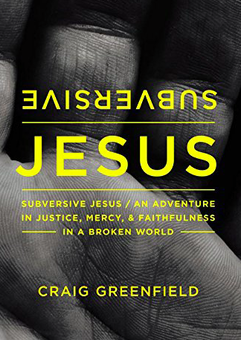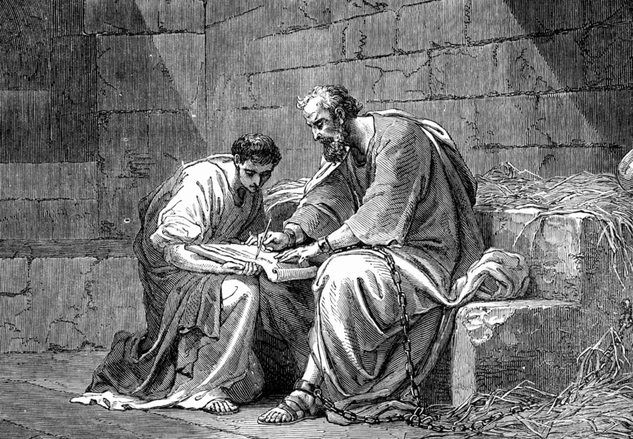I am constantly looking for books I can give away or refer to that might move my friends, maybe just a little, to reconsider their understanding of the gospel and its relationship to the poor. Craig Greenfield’s Subversive Jesus: An Adventure in Justice, Mercy, and Faithfulness in a Broken World is, thankfully, one such book. This volume does exactly what I am looking for: it connects Christians to the issues of poverty and to the poor through reflections on the Bible and through the messiness of ministry. Greenfield points out that respectable Christians don't "throw in their lot with the poor” (22), yet he believes, as I do, that “there is a biblical mandate for Christ-followers to become lobbyists for the poor” (139). Subversive Jesus explains wasted evangelism very well, portraying the relationship between the gospel and social action through the ministry illustrations and, as well, through his autobiographical sketches of real life stories among the poor. Subversive Jesus isn’t just another book guilting Christians into helping the poor. It is as much a confession (of the struggles living out a subversive gospel) and story-telling as it is a reflection on the nature of the gospel and the person of Jesus as the New Testament portrays him. The content—yes, the rightfully convicting content—is embedded throughout the book within his family adventures in learning how to live among the poor—and as Christian neighbors. He confesses, “. . . it wasn’t long before we came face-to-face with the messiness of living on the edges of society with those who struggle—for we cannot separate the beauty and goodness of subversive hospitality from its challenges” (55). Greenfield shares their ministry of hospitality, that is opening up his home and dinner-table to the poor, homeless, and messy (and sometimes reckless) individuals who we, too, often turn away in our hearts long before we even have a table to invite them to. We are led into the vulnerability of the Greenfield family as they experience and learn learn some of the tougher aspects of home and hospitality ministry to the poor. He writes, “Those of us who practice subversive hospitality will forever live in the tension between our finiteness, our human limitations, and grace. It will break our hearts when we have to say no or close our doors” (57). Greenfield does not hold back on the exposition, that is, the power of portraying the Jesus of the gospels. He explains, “I began to understand what this upside-down kingdom on earth might look like. For Jesus’ life was bookended by an empire’s standard response to anyone who is a threat: violence and brutal repression” (24). In fact, he is right to call out church people, exposing how we have tamed Jesus to fit our more suburban (I prefer to say, exurban and nonpoor) lifestyles of home and church: “Many of our Sunday schools continue to encourage followers of Jesus to embrace a respectable Jesus, an agreeable teacher with pleasant stories to tell about how to be good. But no one would crucify this Jesus. No one would be threatened by such a bland personal morality. Instead, they’d invite this Jesus over for a cup of tea and a chat about the weather” (25). He reminds us of one of Luke's marks of the church strangely absent today: “God’s grace was so powerfully at work in them all that there were no needy persons among them” [Acts 4:33–34, emphasis added by Greenfield] (52). The stories in the book are not prescriptive, he writes, but are demonstrations of how God worked in his life and, as well, his family’s life. He draws us into the overwhelming sense of hopelessness we can have when we are confronted by the effects of poverty and brokenness: “Who hasn’t felt like this in the face of our broken world? We can’t help feeling overwhelmed when we hear that on billion people live in slums worldwide, or that four hundred busloads of children die every day from preventable illnesses. It’s hard enough to face the challenges of our own impoverished neighborhoods and inner cities” (50). Yet, he is quick to point out that we have put too much reliance on non-church organizations and para-church ministries to deal with the poor and marginalized: “. . . we rely on soup kitchens and institutions. Instead of opening our churches and homes to the hungry, we are taught to “leave it to the professionals.” He says, “this is the way of the empire.” There is, however, hope for the poor in God’s kingdom and among Jesus’ followers. “Jesus promises that even though the empire is a cold and lonely place for the vulnerable, his kingdom on earth will be especially good news for the poor. As followers of Jesus, we need to figure out what that good news looks like as we respond to those who are suffering because of poverty and oppression, whether a beggar on the corner or an orphaned child in a slum halfway around the world” (68). Yet, we choose to live apart from the poor, separated from the people and the effects of poverty in which they, themselves, must—and mostly not by choice—live their everyday lives. “As people of privilege, we make choices every day about where we will live, where we will shop, how we will travel, and who we will spend time with. Often these choices isolate us from those on the margins of society. Our isolation from the poor shapes how we understand poverty, and it drives how we respond to it” (107) Many of us have the power (and platform) to change how we view and approach the poor and the issues of poverty—first in our own lives, then our church life, and, as well, through advocacy and example, in the world around us. But, Greenfield pin points the problem: “Those who hold the most power and authority in society are the least likely to want to change the system that produces poverty” (111). The Greenfield family understands the risk involved with following the subversive Jesus (the Jesus of the New Testament): “We realized at a very personal level that when we align ourselves with the poor and seek to be in solidarity with those Jesus called us to embrace, there will be a cost” (157). If the gospel is subversive to culture and power, what is it about your life as a Christian that is, well, subversive? I highly recommend Subversive Jesus for your own edification, perhaps as a small group reading among your church family. You will be convicted, encouraged, at times angered, and you will cry. But most of all, you will be confronted by the subversive Jesus of the gospels and pierced and humbled by a life (the Greenfield’s) caught up in the beauty, messiness, and ministry to the least among us. Greenfield is the founder and director of Alongsiders International (alongsiders.org), an organization that seeks to mobilize and equip thousands of young Christians in the developing world to walk alongside those who walk alone, especially the orphans and vulnerable children in their own communities. The Greenfields have lived and ministered for more than fifteen years in slums and inner cities in Asia and North America. Subversive Jesus is available on Amazon. And, his first book, The Urban Halo: a story of hope for orphans of the poor, is also available. Both books may also be found on Craig's website, craiggreenfield.com.
0 Comments
We do not lack for sermons and books on the topic of discipleship. Some Christians speak about discipleship as if it is something to be into—like being into politics or into running or into body building or into gaming. But such a view of discipleship betrays some faulty assumptions. First, we tend to formulate the call to discipleship as an option for Christians to consider. Second, there is a tendency (especially in today’s consumer oriented churches) to make discipleship attractive (with a book you can buy or a study-guide to purchase). The fact is, there is nothing attractive about discipleship. It calls for an undivided loyalty to the gospel, full allegiance to Jesus, the Messiah. It calls people to place themselves at the disposal of Jesus and the work of his church. Dietrich Bonhoeffer said it best: “When Christ calls a man, he bids him come and die.” As Paul puts it in his letter to the Philippians, both Timothy and Epaphroditus are examples of discipleship. They, indeed, exemplify what J.B. Phillips remarked about the early Church: "Perhaps because of their very simplicity, perhaps because of the readiness to believe, to obey, to give, to suffer and if need be to die, the Spirit of God found what He must always be seeking—a fellowship of men and women so united in faith and love that He can work in them and through them with the minimum of . . . hindrance. Paul, in referring to Timothy and Epaphroditus, is they are examples of a committed Christian life—they are examples of the Christian life of discipleship. The Christian life is a call to discipleship, a call to authentic Christian living. Whereas sanctification is the process (and progress) of becoming more like Christ, discipleship is the discipline, the lifestyle of the one who is becoming more like Christ. As one reads through a text like Philippians 2:19–30, we discover the marks of the true disciple of Jesus Christ. Paul certainly is informing his friends back in Philippi about his situation. But in doing so he uses special words to describe Timothy and Epaphroditus. He wants the Christians of the Philippian church to know these two men are models of the Christ hymn Paul earlier cited (2:5–7): "Have this mind among yourselves, which is yours in Christ Jesus, who, though he was in the form of God, did not count equality with God a thing to be grasped, but emptied himself, by taking the form of a servant . . ." We should resolve to be the servants, bond slaves actually, that characterize Jesus; servants that lives the gospel as models of Jesus. As Christ followers, we shine as lights in a dark world. Timothy and Epaphroditus model this for us. Paul shows us the way (2:12–18). "Therefore, my beloved, as you have always obeyed, so now, not only as in my presence but much more in my absence, work out your own salvation with fear and trembling, for it is God who works in you, both to will and to work for his good pleasure. Do all things without grumbling or disputing, that you may be blameless and innocent, children of God without blemish in the midst of a crooked and twisted generation, among whom you shine as lights in the world, holding fast to the word of life, so that in the day of Christ I may be proud that I did not run in vain or labor in vain. Even if I am to be poured out as a drink offering upon the sacrificial offering of your faith, I am glad and rejoice with you all. Likewise you also should be glad and rejoice with me."
* * * * * * * * * * * * * * * * * * * * * * * *  Came to Cambridge, MA today on the way up to see my Amanda in Portsmouth, NH. I stopped in Harvard Square for a lunch meeting. After parking my car and walking up to the square, I encountered a man readying himself to play guitar and work for some alms. I put his first dollar of the day in his hat. I said, "I know you’re not ready, so I’ll catch you on the way back." "How long will you be," he asked back. "About an hour and a half." "Oh my," he replied. "I won’t be here then, how about a toke of my bong then?" I said, "No thanks. I’m a pastor heading up to a meeting and that would not be a good thing." He blessed me and went on tuning his guitar.  This is not Marvin; but that is the hat This is not Marvin; but that is the hat After a brief stop at Curious George, a cool toy store, I headed to the Russell House Tavern to meet up with a fellow PCA pastor. Out front on the sidewalk, a man begging for some change reached out his cup to me—I smile, chuckled, actually, and told him I didn’t have any change, but maybe after lunch when I come out. He said fine but "can I have your hat." I smiled. No you can’t have my hat. He said he liked my hat. I said everyone likes my hat. When I did come out, he was there (waiting?) and said, "Hey, hat man, I still like your hat." "Everyone still likes my hat," I smiled, reaching into my pocket and gave him a dollar. He was happy. I told him I was a pastor and so was my friend here. He said I was better looking than my friend. See what compliments a dollar gets you. He said, "You can pray for me and I will pray for you." I asked his name. "Marvin." So, I grabbed his hand. We bowed, right there in Harvard Square, right there on the sidewalk, with his cup in hand, we prayed for Marvin. He joined us. "God, meet Marvin’s needs. Let him know you are close to him." He was so thankful. He was still homeless and poor, though. Yet, a little closer to Jesus—or maybe my friend and I were a little closer to Jesus. Surrounded by such wealth. Some of the world’s brightest right there teaching and being taught—Harvard, MIT just down the way. At Harvard Square. And still, poverty licks the streets right at the door—well, outside the doors. I told the pastor friend with me, "You see, the Hill follows me everywhere." My heart breaks. As my pastor friend and I parted, I soaked in Harvard Square and pondered where Marvin had disappeared to. I glanced back and he had literally vanished. Gone. Marvin and the hustle and bustle and sights of Harvard Square created a blend of thoughts as I walked back to my car: "Until we forsake all earthly power and submit to God’s grace and mercy as our only possession, we will continue to be beggars at the doors of this world and be a part of the cause of such poverty. I think my brother, Doran Wright, is correct. Until we are their neighbors . . . until I am Marvin's neighbor . . ." Didn’t expect this at Harvard Square, today. Found Jesus on the sidewalks begging for alms and admiring my hat.
|
AuthorChip M. Anderson, advocate for biblical social action; pastor of an urban church plant in the Hill neighborhood of New Haven, CT; husband, father, author, former Greek & NT professor; and, 19 years involved with social action. Archives
February 2024
Categories
All
|
Pages |
More Pages |
|




 RSS Feed
RSS Feed